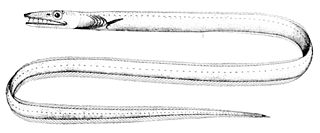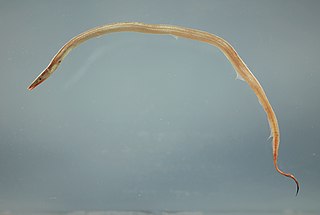
The superorder Elopomorpha contains a variety of types of fishes that range from typical silvery-colored species, such as the tarpons and ladyfishes of the Elopiformes and the bonefishes of the Albuliformes, to the long and slender, smooth-bodied eels of the Anguilliformes. The one characteristic uniting this group of fishes is they all have leptocephalus larvae, which are unique to the Elopomorpha. No other fishes have this type of larvae.

Nettastomatidae, the duckbill eels or witch eels are a family of eels. The name is from νῆττα and στόμα.
Gnathophis is a genus of marine congrid eels.

Eels are ray-finned fish belonging to the order Anguilliformes, which consists of eight suborders, 20 families, 164 genera, and about 1000 species. Eels undergo considerable development from the early larval stage to the eventual adult stage and are usually predators.
Bathycongrus is a genus of eels in the family Congridae.

Rhynchoconger is a genus of eels in the family Congridae.

Xenomystax is a genus of eels in the family Congridae. It currently contains the following species:

Nettenchelys is a genus of eels in the duckbill eel family Nettastomatidae.
Saurenchelys is a genus of eels in the duckbill eel family Nettastomatidae.
The whiptail conger, also known as the conger eel in Cuba, is an eel in the family Congridae. It was described by Isaac Ginsburg in 1951, originally under the genus Congrina. It is a marine, deep water-dwelling eel which is known from the western Atlantic Ocean, including the United States in the northern Gulf of Mexico and northern South America. It is known to dwell at a depth of 203 meters (666 ft). Males can reach a maximum total length of 61 centimeters (24 in).
Gavialiceps javanicus, the duckbill conger, is an eel in the family Muraenesocidae. It was described by Emma Stanislavovna Karmovskaya in 1993. It is a marine, deep water-dwelling eel which is known from the Indo-West Pacific, including northwestern Australia, Java, and Indonesia. It dwells at a depth range of 560–600 metres. Males can reach a maximum total length of 89 centimetres.

The blacktail pike-conger is an eel in the family Nettastomatidae. It was described by George Brown Goode and Tarleton Hoffman Bean in 1896. It is a subtropical, marine eel which is known from the western Atlantic Ocean. It is known to dwell at a maximum depth of 203 meters. Males can reach a maximum total length of 36.6 centimeters.

The freckled pike-conger, also known as the silver conger, is an eel in the family Nettastomatidae. It was described by Isaac Ginsburg in 1951. It is a marine, subtropical eel which is known from the western central Atlantic Ocean, including the Gulf of Mexico, Colombia, and towards the mouth of the Amazon River. It dwells at a depth range of 55–310 meters. Males can reach a maximum total length of 54.2 centimeters.
Hoplunnis megista is an eel in the family Nettastomatidae. It was described by David G. Smith and Robert H. Kanazawa in 1989. It is a marine, deep water-dwelling eel which is known from the western central Atlantic Ocean, including Nicaragua and Panama. It is known to dwell at a depth range of 366 to 421 meters. Males can reach a maximum total length of 91.7 centimeters (36.1 in).
The slender duckbill eel is an eel in the family Nettastomatidae. It was described by Charles Tate Regan in 1915. It is a marine, deep water-dwelling eel which is known from the Gulf of Guinea, in the eastern Atlantic Ocean. It inhabits the continental shelf and slope. Males can reach a maximum total length of 55.5 centimetres (21.9 in).
Hoplunnis sicarius is an eel in the family Nettastomatidae. It was described by Samuel Garman in 1899, originally under the genus Atopichthys. It is a marine, tropical eel which is known from the eastern central Pacific Ocean, including Mazatlan, Mexico, and Panama. It is known to dwell at a depth of 1,431 metres (4,695 ft), and inhabits substrates. Unlike many eel species, it does not form burrows.
Hoplunnis similis is an eel in the family Nettastomatidae. It was described by David G. Smith in 1989. It is a marine, deep water-dwelling eel which is known from the western central Atlantic Ocean, including Florida, USA, Honduras and Nicaragua. It is known to dwell at a depth range of 146 to 329 meters. Males can reach a maximum total length of 49.3 centimeters (19.4 in).
The spotted pike-conger, also known as the conger eel in Cuba, is an eel in the family Nettastomatidae. It was described by Isaac Ginsburg in 1951. It is a marine, deep water-dwelling eel which is known from the western Atlantic Ocean, including the Gulf of Mexico and the Straits of Florida, USA. It dwells at a depth range of 130 to 420 meters, and inhabits benthic sediments of mud. Males can reach a maximum total length of 46 centimeters (18 in).

Congroidei is a suborder of ray-finned fishes belonging to the order Anguilliformes, the eels. These eels are mostly marine, although a few species of snake eel will enter freshwater, and they are found in tropical and tempareate waters throughout the world.








